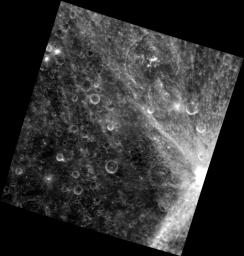This image, taken by MESSENGER's Narrow Angle Camera, captures Qi Bashi, the brightest crater at the right edge of the view. The brilliant ejecta rays of Qi Bashi extend mostly to the north and south, instead of in all directions. When an impact crater is formed, bright, fresh material is ejected out of the crater into the surrounding area; however, the asymmetrical ejecta as seen here necessitates an extremely low impact angle.
This image was acquired as part of MDIS's high-resolution surface morphology base map. The surface morphology base map will cover more than 90% of Mercury's surface with an average resolution of 250 meters/pixel (0.16 miles/pixel or 820 feet/pixel). Images acquired for the surface morphology base map typically have off-vertical Sun angles (i.e., high incidence angles) and visible shadows so as to reveal clearly the topographic form of geologic features.
The MESSENGER spacecraft is the first ever to orbit the planet Mercury, and the spacecraft's seven scientific instruments and radio science investigation are unraveling the history and evolution of the Solar System's innermost planet. Visit the Why Mercury? section of this website to learn more about the key science
questions that the MESSENGER mission is addressing. During the one-year primary mission, MDIS is
scheduled to acquire more than 75,000 images in support of MESSENGER's science
goals.
Date acquired: July 02, 2011
Image Mission Elapsed Time (MET): 218071882
Image ID: 452164
Instrument: Narrow Angle Camera (NAC) of the Mercury Dual Imaging System (MDIS)
Center Latitude: -3.15°
Center Longitude: 162.3° E
Resolution: 199 meters/pixel
Scale: This image is approximately 200 km across.
Incidence Angle: 3.2°
Emission Angle: 24.9°
Phase Angle: 28.1°
These images are from MESSENGER, a NASA Discovery mission to conduct the first orbital study of the innermost planet, Mercury. For information regarding the use of images, see the MESSENGER image use policy.

 Planetary Data System
Planetary Data System












